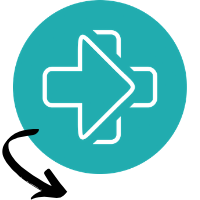What should you do if you think you’ve been exposed to the coronavirus?
COVID-19 exposure in the workplace and in ours schools creates uncertainty about how to respond.
Here are the steps you should take when you think you may have been exposed.
Direct Primary Care of Oklahoma is membership based health clinic committed to providing comprehensive, affordable family medicine care. You deserve a health care model that puts your needs first, we can help.
What is considered a close exposure to coronavirus?
The CDC definition for a close exposure is less than 6 feet for greater than 15 minutes. The main factors to consider when defining a close contact are proximity, duration of exposure (longer exposure time leads to increased risk), and situation of exposure (symptomatic individuals who are coughing increases risk). While masks may help reduce the spread of illness, the determination of risk of infection in a close exposure should be made irrespective of if a mask was worn.
Who is considered a positive exposure in determining your risk?
Currently, there are two main scenarios of close exposure that warrant action:
1. A close exposure to a person with COVID-19 who has symptoms when the exposure occurred in the period from 2 days before symptom onset until that person has met criteria to discontinue isolation.
2. A close exposure to an asymptomatic person who has tested positive for COVID-19 when the exposure occurred in the period from 2 days before the collection date of that person's test until that individual has criteria has been met to discontinue isolation.
What are your next steps if you have determined that you have had a close exposure with COVID-19 but not experiencing any symptoms?
CDC recommended precautions include:
Stay at home until 14 days after last exposure and maintain social distancing (at least 6 feet) from others at all times. Take special precautions to avoid contact with people who are high-risk for severe illness.
Self monitor for symptoms and check temperature twice per day.
Follow CDC guidelines if you develop symptoms.
Contact your primary care physician to help determine if you need to be tested.
When can you discontinue home isolation for COVID-19?
Symptoms may present 2-14 days after exposure to the coronavirus. If you have had a close exposure to COVID-19 but are asymptomatic, you should isolate at home for 14 days to monitor for symptoms.
For individuals with COVID-19 who have symptoms, they may discontinue home isolation when:
At least 10 days have passed since symptom onset AND
At least 24 hours have passed since resolution of fever without the use of a fever-reducing medication (such as Tylenol, Ibuprofen, or Aspirin) AND
Other symptoms have improved.
Retesting is not recommended to determine when to discontinue home isolation.
For your health,
Terry Rimmer, MD
Get the latest health news and updates sent directly to your email for free!




